I Regret Getting Turkish Residency… Mistakes to Avoid
The decision to relocate and obtain residency in a new country is one laden with complexities, hopes, and, sometimes, unforeseen consequences. In the context of Turkey, a nation that straddles both Europe and Asia, many are drawn by its rich history, cultural tapestry, and economic opportunities. However, navigating through the legal and bureaucratic processes of obtaining Turkish residency can be fraught with challenges that might lead to regret for those who fail to prepare adequately. This discussion aims to unravel the intricate web of personal experiences, lessons learned, and crucial missteps to avoid for individuals considering making Turkey their new home. Through the lens of hindsight, we delve into the common pitfalls that have marred the journey for some, turning the dream of a life in this vibrant country into a cautionary tale for future aspirants.
Navigating Cultural Landscapes: Long-Term Expatriates Share Their Stories
One of the most jarring aspects of taking up residency in Turkey that many expatriates do not anticipate is the profound cultural transition. Long-term expatriates recount tales of navigating a complex cultural landscape, with traditions and social norms vastly different from their own. They warn of the initial romanticism of Turkey’s vibrant culture quickly giving way to a sense of isolation if one does not actively seek to understand and integrate into the local way of life. The intricacies of communication, developing a solid network of local friends, and overcoming language barriers are often underestimated. Many expatriates express regret over not having invested time and effort into learning Turkish before their arrival, a mistake that can create an invisible wall between them and the immersive experience they yearn for, leaving them floating on the periphery of their new community, rather than feeling a part of it.
To compound the cultural shock, long-term expatriates highlight that an understanding of Turkey’s bureaucratic systems is equally vital. Stories abound of individuals who faced significant frustration with seemingly endless paperwork, residency permit issues, and legal hurdles, often accentuated by the language barrier. A common mistake is to assume that processes will mirror those in one’s home country, leading to miscalculations in the time and effort required to navigate these administrative tasks. Networking with fellow expatriates who have trodden the path before, seeking advice from reputable legal professionals, and engaging with community support groups are strongly advised. These steps offer not only practical assistance but also provide psychological comfort through solidarity and shared experiences, mitigating feelings of frustration and isolation that can arise from battling the complexities of Turkish bureaucracy alone.
Furthermore, seasoned expatriates emphasize the importance of maintaining a resilient mindset in the face of cultural misunderstandings and faux pas, which are inevitable when one is still acclimating to a new social environment. Patience and a sense of humor can be invaluable tools when navigating the subtleties of Turkish etiquette and the expectations in various social contexts. Reflecting on their experiences, many wish they had been more proactive in engaging with the culture—be it through community events, local clubs, or volunteer work—as this would have facilitated deeper connections and a richer understanding of societal dynamics. Over time, those who have successfully woven themselves into the fabric of their local areas often find that their initial regrets give way to a sense of belonging, affirming the necessity of confronting and learning from the cultural challenges encountered.
The Expat Experience: Insights from Decades Abroad
Embarking on the expat journey in Turkey is often romanticized through rose-tinted visions of balmy evenings by the Bosphorus, the bustling bazaars, and the fusion of modernity with ancient tradition. However, for those who’ve lived the reality, the picture can be starkly different. Many long-term expats have learned the hard way that failure to understand and respect the nuances of Turkish culture can lead to social isolation and significant distress. Language barriers, while expected, often prove to be higher than anticipated, turning simple daily tasks into herculean efforts. What’s more, the assumption that Western practices and norms will be easily accommodated can quickly lead to frustration. Seasoned foreign residents can attest that successful integration requires patience, openness to embracing a fundamentally different lifestyle, and a willing immersion into the maze of local customs and expectations.
Furthermore, the legal landscape in Turkey regarding residency permits and property laws can be a minefield for the uninformed expat. Changes to regulations can happen swiftly and with little fanfare, leaving unprepared residents scrambling. Many expats report that what was initially a straightforward process can become mired in paperwork, legal complexities, and bureaucratic red tape that is both time-consuming and stressful. Experiences of dealing with residency renewals and property disputes have highlighted the critical importance of seeking reputable legal advice from the outset. Those who have navigated these waters stress the need to have trusted local advisors who understand the intricacies of Turkish legal proceedings. Such oversight has led some expats to face unexpected residency lapses or financial losses, turning their dream of a life abroad into a precarious legal battle to secure their status and protect their investments.
Finally, the sense of community and personal connections within Turkey can profoundly impact the overall expat experience. Those who have thrived emphasise cultivating relationships with both the local populace and fellow internationals. Conversely, expats who’ve isolated themselves or stayed within their own cultural enclaves have found their experience less fulfilling and sometimes fraught with complications. The importance of building a robust support system cannot be overstated – it’s not merely about having friends, but about engaging in genuine cultural exchange and acquiring advocates who can guide you through the idiosyncrasies of Turkish life. Long-term expats reflect that some of their most significant regrets stem from underestimating the value of community ties, which, in difficult times, can mean the difference between an enriching experience and one filled with regret.
Integration and Identity: Lifelong Lessons from Global Citizens
One of the most significant oversights that can sour the experience of new residents is underestimating the importance of integration into the Turkish community. Many ex-pats, lured by the beauty of the landscape and the promise of a laid-back lifestyle, often find themselves isolated due to language barriers and cultural differences. While it’s possible to find expat enclaves where one might not need to speak Turkish, this can severely limit the depth of one’s experience and understanding of the country’s rich heritage. Lessons from seasoned global citizens stress the importance of learning the language and engaging with local customs and social norms. Those who neglect these aspects of their relocation may later regret not having forged a stronger connection with Turkey’s identity, which can lead to feelings of alienation and missed opportunities for personal growth and community involvement.
Another regret stems from misjudging the nuances of Turkish societal norms which, when ignored, can create a rift between expatriates and local communities. For instance, understanding Turkish notions of hospitality and respect, which are deeply ingrained, are critical for fostering good relationships. Newcomers often overlook the need to build a local network that can support them through both bureaucratic challenges and cultural assimilation. This underestimation can lead to a sense of regret when expats encounter difficulties that could have been mitigated through stronger community ties. By participating in local events, respecting Turkish customs such as removing shoes before entering homes, and showing willingness to adapt, expats demonstrate openness that can enrich their social fabric and anchor them more deeply within their new homeland.
Finally, long-term Turkish residents often reflect that their initial regrets were pivotal in triggering an introspective journey, ultimately forging a more profound identity as global citizens. Those who persevere in bridging cultural gaps with curiosity and humility find that their adaptability and resilience grow, leading to a more enriching and authentic experience. They advise newcomers to view integration not as a loss of one’s origin, but as an expansion of one’s cultural repertoire. Embracing Turkey’s diverse heritage and societal fabric then becomes not just an act of assimilation, but a celebration of multiculturalism and personal evolution. In this light, regret can transform into gratitude for the unexpected life lessons and strength gained through the challenges of building a life in a complex and beautiful new land.






